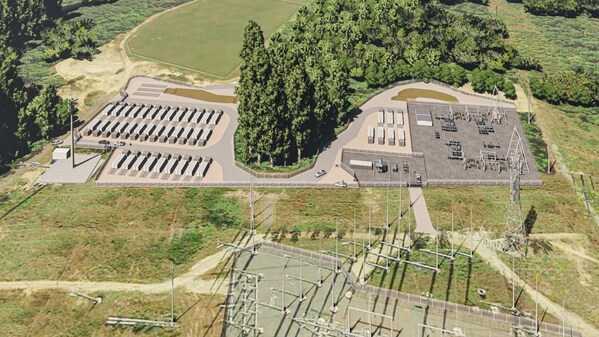Plus Power™ – developer of utility-scale energy storage projects that enable a more efficient and reliable electrical grid – has announced the close of construction and term financing for the first major utility-scale standalone battery storage system in construction on the New England grid, among other notable firsts for standalone storage in the region. The Cranberry Point facility, located in Carver, Massachusetts, will help stabilize the electric grid during the region’s increasing number of extreme weather events while helping to suppress volatile wholesale prices for ratepayers.
The 150 MW / 300 MWh Cranberry Point Energy Storage facility was among the first few standalone batteries ever to clear the Forward Capacity Auction in 2021 with the Independent System Operator of New England, or ISO-NE. With that award, Cranberry Point committed to provide capacity to the ISO-NE market through 2031. In the same auction, Plus Power’s 175 MW / 350 MWh Cross Town Energy Storage facility in Gorham, Maine also won a capacity payment commitment from ISO-NE through 2031.
First Citizens Bank and Nord LB acted as coordinating lead arrangers while Investec and Siemens Financial Services acted as joint lead arrangers. Investec is the administrative agent and U.S. Bank is the depositary bank. Sheppard Mullin acted as transaction counsel for Plus Power and Winston & Strawn acted as transaction counsel for the lenders. The $133 million financing includes a construction-to-term loan, bridge loan and letter of credit facility.
Cranberry Point and Cross Town are the largest battery energy storage projects in construction with planned operations in New England and will be online during Summer 2025. The Cross Town Energy Storage project commenced construction in April 2024 and is now the largest battery coming online in the region. The Cranberry Point facility, under construction since December 2023, is the second largest and represents approximately a third of the Commonwealth’s goal to deploy 1,000 MWh of battery energy storage by 2025.
The announcement marks the first major financing of a utility-scale project that will benefit from Clean Peak Energy Certificates (CPECs), a relatively new and innovative incentive program unique to Massachusetts. The Commonwealth launched the Clean Peak Standard in 2020 to incentivize the pairing of emissions-free generation with seasonal peak demand. In doing so, the Clean Peak program recognizes and remunerates batteries for their additional service to shift clean loads to replace polluting ‘peaking’ generation.




